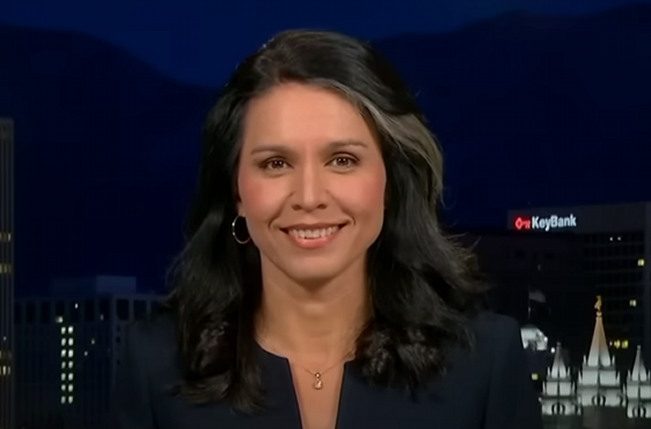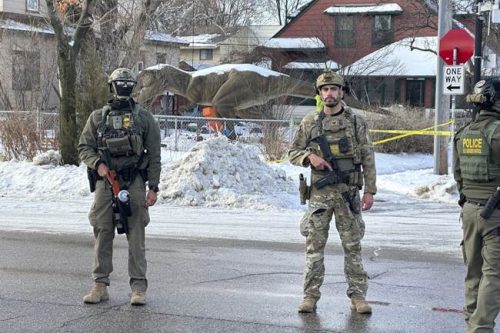Tulsi Gabbard’s nomination for Director of National Intelligence (DNI) moved forward after a closely watched and highly contentious Senate Intelligence Committee hearing. The committee vote, split along party lines at 9-8, signaled just how divisive her nomination has become. While Republican Senators Susan Collins (R-ME) and Todd Young (R-IN) were initially hesitant, both ultimately voted in favor, giving Gabbard the narrow majority needed to advance.
The hearing itself was a fiery spectacle, with senators grilling Gabbard on issues ranging from her controversial 2017 meeting with Syrian President Bashar al-Assad to her stance on surveillance and whistleblower protections. Gabbard, a former Democratic congresswoman from Hawaii and an Iraq War veteran, defended her record with poise, emphasizing her commitment to transparency and national security.
“Throughout my 22 years of military service and my time in Congress, I have always taken the privilege of holding a security clearance seriously,” Gabbard told the committee. “If confirmed as Director of National Intelligence, my mission will be to ensure the safety and security of the American people while protecting civil liberties.”
Senator Tom Cotton (R-AR) pressed Gabbard on her previous criticism of U.S. foreign policy in the Middle East, particularly her opposition to regime-change wars. Cotton expressed concerns about how her views might influence intelligence decisions. Gabbard countered by reaffirming her belief in realist diplomacy and the importance of engaging with adversaries to avoid unnecessary conflicts.
“Diplomacy requires engagement, even with those we disagree with,” she said. “My meeting with Assad was not an endorsement but an effort to seek a deeper understanding of the complex situation in Syria.”
Another contentious topic was Gabbard’s stance on whistleblower Edward Snowden. While she stopped short of endorsing Snowden’s actions, Gabbard acknowledged the importance of whistleblower protections in exposing government overreach. She assured the committee that she would prioritize preventing unauthorized leaks while also fostering a culture of accountability within the intelligence community.
“We must strike a balance,” Gabbard said. “Protecting classified information is critical to national security, but we cannot ignore the need for transparency and oversight.”
While Gabbard’s confirmation progressed, other key nominees faced their own challenges in the Senate. Robert F. Kennedy Jr., nominated for Secretary of Health and Human Services (HHS), cleared the Senate Finance Committee with a narrow party-line vote of 14-13. The vote was not without drama, as Senator Bill Cassidy (R-LA)—known for his controversial vote to impeach President Trump—ultimately supported RFK Jr., despite earlier concerns about his vaccine skepticism and past statements on public health policy.
Meanwhile, Pam Bondi, nominated for U.S. Attorney General, moved closer to confirmation after a 52-46 Senate vote to invoke cloture. This procedural step paves the way for a final vote, likely within days. Bondi’s hearing had its own share of heated exchanges, particularly on issues related to election integrity and criminal justice reform.
Outside the Senate chambers, the battle over these nominations has mobilized Trump supporters across the country. Capitol Hill’s voicemail system was reportedly overwhelmed, receiving over 600 calls per minute from citizens urging senators to confirm Gabbard, RFK Jr., Bondi, and Kash Patel for FBI Director.
Nick Sortor, a prominent conservative activist, shared on social media that the Senate’s voicemail system temporarily went offline due to the sheer volume of calls.
“This is what winning looks like,” Sortor wrote. “Keep the pressure on!”
The Gateway Pundit, a vocal supporter of President Trump’s nominees, described the public response as a “grassroots victory,” highlighting the growing influence of conservative media in shaping public opinion and rallying support for Trump’s picks.
The stakes for these nominations are enormous. Gabbard’s confirmation would mark a significant shift in the leadership of the intelligence community. Her pragmatic approach to foreign policy and strong emphasis on civil liberties could redefine the priorities of the DNI. Supporters argue that her military background and bipartisan appeal make her uniquely qualified to lead the intelligence community during a period of heightened global tensions and domestic challenges.
Senator Josh Hawley (R-MO) expressed his full support for Gabbard, praising her independent thinking and commitment to national security.
“In a time when partisanship dominates Washington, Tulsi Gabbard is a breath of fresh air,” Hawley said. “Her leadership will ensure that our intelligence agencies remain focused on protecting Americans, not pushing political agendas.”
Critics, however, remain wary. Senator Mark Warner (D-VA), the ranking Democrat on the committee, questioned whether Gabbard’s views on U.S. surveillance programs align with the broader goals of the intelligence community. He expressed concerns about potential policy shifts that could weaken counterterrorism efforts.
With Gabbard’s nomination now heading to the full Senate for a final vote, the political landscape is heating up. The coming weeks will be pivotal as senators weigh their decisions, balancing constituent pressure with their own assessments of each nominee’s qualifications.
The confirmations of Gabbard, RFK Jr., Bondi, and potentially Kash Patel represent more than just personnel changes—they symbolize a broader ideological battle over the future of U.S. policy and governance. The Senate’s decisions will shape the national security, health, and justice landscapes for years to come.
As the process unfolds, public engagement continues to play a critical role. The flood of calls, social media campaigns, and grassroots efforts illustrate the growing influence of ordinary citizens in shaping high-level political outcomes.
The nation watches closely, waiting to see how these pivotal votes will unfold—and what they will mean for America’s future.






